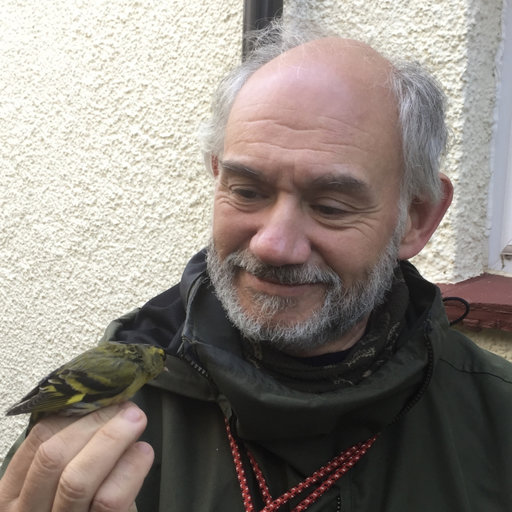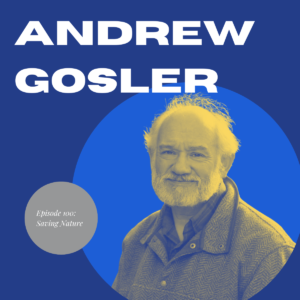Conservationist and Professor Andrew Gosler’s conversion story is not unlike that of fellow former Oxford scholar C.S. Lewis.
Like Lewis before him, Andrew came to the faith deep into his academic career.
In the same way, it was a fellow Oxford colleague who swayed him towards faith in Jesus – but unlike Lewis (who had the voice of J.R.R. Tolkien steering him), Andrew was set on his journey to faith by someone who argued against God.
A friend of the birds
As an ethno-ornithologist, Andrew spent most of his professional time working in both the great outdoors and ivory towers of academia, documenting the relationship between humanity and birds.
Throughout his career, he has come to be a respected conservationist, having penned countless articles, multiple books, and delivered dozens of lectures around the world, stressing the importance of caring for nature.

Andrew Gosler is a true friend of the birds
In all this, Andrew – having been raised in an atheist-Jewish family – hadn’t considered the notion of a divine creator behind it all.
However, an encounter with Oxford colleague Richard Dawkins’ seminal 1976 work The Selfish Gene set him on an unexpected path – first to consider theism, and eventually Christianity.
“I recognized even on my first reading in the 1970s that there was a logical flaw in (Dawkins’) argument,” Gosler said, speaking on the Undeceptions podcast.
“The basic thesis is that selfish behaviour isn’t our fault, but rather it’s our genes – that we’re just the product of our genes.
“Every animal breeder knows that’s not true because … you’ve got typically 50 per cent environmental influences as well.
“But basically (Dawkins was) saying you are what your genes are, and your genes are the main story through history.
“So his thesis is an argument for genetic determinism. The problem is in the last page or two, he says that we can choose to reject the tyranny of our genes. We can choose, and decide to be nice to each other.”
“We are survival machines—robot vehicles blindly programmed to preserve the selfish molecules known as genes. This is a truth which still fills me with astonishment.” – Richard Dawkins, The Selfish Gene
“The problem with that philosophically is no, we can’t, not if the rest of your book is true … where has this desire to be nice to each other come from?”
Pushed towards the cross
As Andrew continued to read the works of Dawkins, he was increasingly pushed towards the claims of Christianity.
“I was reading these things and was growing increasingly frustrated that he’d smuggle in some statement about, ‘Oh, by the way, Christians don’t believe this. Aren’t they stupid?’ And I’m thinking, ‘I don’t care. Why do you say that?
“I subconsciously got to a point where I thought ‘You so don’t want me to know about Christianity that I want to know about Christianity’”.
After decades of thought, life experience, and reading on the subject, Andrew was eventually baptised in 2000, more than thirty years after he first encountered the ideas in The Selfish Gene.
Since then, Andrew has come to see conservationism within a Christain framework; according to him, faith has made sense of his life’s work.
“If I take all the components of my life, what I’m interested in … whether it was birds or conservation or ecology, there’s no coherent pattern without a metaphysic or a theology,” he said.
“Atheism is theology, but it fundamentally fails because it doesn’t give a coherent, satisfying explanation for things.
“To say that we can explain life because of evolution … well, yeah, up to a point you can say life is the way it is because it’s evolved this way, but that does not answer the question.
“If you believe that life or anything has intrinsic value, then actually that is the strongest argument for God.”
Check out this short interview with Andrew on his day-to-day work
For Andrew, conservationism is also the fulfilment of a command passed down by God in the opening chapters of history – to care for creation.
He wants to see more believers come to terms with this reality
“Part of the problem (going back to a specifically Christian faith perspective) is the misunderstanding of Genesis to think that this planet is here for us as our playground,” he concludes.
“The human is put into the garden to look after it.
“If you wanna find a purpose for humanity, that sounds a pretty good one. That’s biblical.
“You are here to look after the place. How are you doing it? Bloody awful.”
Adapted by Alasdair Belling. Hear Andrew’s full story, how he navigates the intersection of evolution and faith and heaps more on the Undeceptions episode ‘Saving Nature‘

Want to be further undeceived?
Check out our network of podcasts and articles in the Undeceptions Library.












































